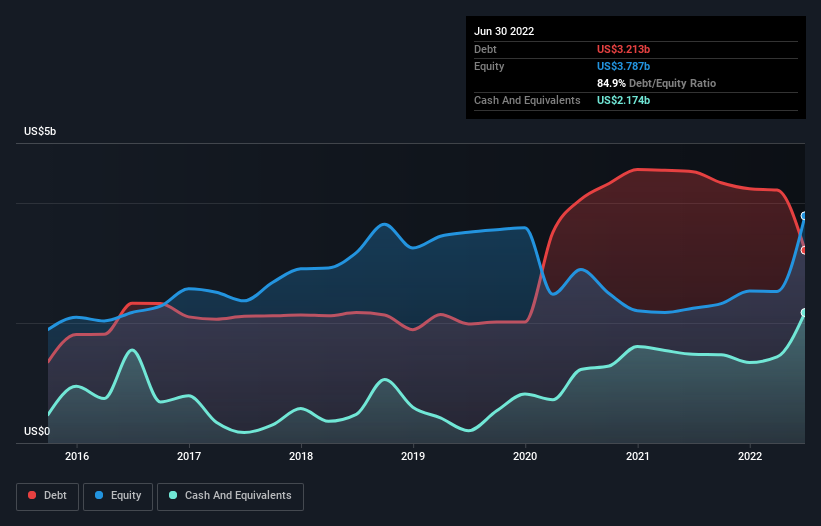
David Iben put it well when he said, 'Volatility is not a risk we care about. What we care about is avoiding the permanent loss of capital.' It's only natural to consider a company's balance sheet when you examine how risky it is, since debt is often involved when a business collapses. We note that PBF Energy Inc. (NYSE:PBF) does have debt on its balance sheet. But should shareholders be worried about its use of debt?
When Is Debt A Problem?
Debt and other liabilities become risky for a business when it cannot easily fulfill those obligations, either with free cash flow or by raising capital at an attractive price. If things get really bad, the lenders can take control of the business. While that is not too common, we often do see indebted companies permanently diluting shareholders because lenders force them to raise capital at a distressed price. Of course, plenty of companies use debt to fund growth, without any negative consequences. When we think about a company's use of debt, we first look at cash and debt together.
See our latest analysis for PBF Energy
How Much Debt Does PBF Energy Carry?
The image below, which you can click on for greater detail, shows that PBF Energy had debt of US$3.21b at the end of June 2022, a reduction from US$4.52b over a year. However, it also had US$2.17b in cash, and so its net debt is US$1.04b.

How Strong Is PBF Energy's Balance Sheet?
The latest balance sheet data shows that PBF Energy had liabilities of US$6.77b due within a year, and liabilities of US$3.42b falling due after that. Offsetting this, it had US$2.17b in cash and US$1.95b in receivables that were due within 12 months. So its liabilities outweigh the sum of its cash and (near-term) receivables by US$6.07b.
Given this deficit is actually higher than the company's market capitalization of US$4.08b, we think shareholders really should watch PBF Energy's debt levels, like a parent watching their child ride a bike for the first time. Hypothetically, extremely heavy dilution would be required if the company were forced to pay down its liabilities by raising capital at the current share price.
In order to size up a company's debt relative to its earnings, we calculate its net debt divided by its earnings before interest, tax, depreciation, and amortization (EBITDA) and its earnings before interest and tax (EBIT) divided by its interest expense (its interest cover). This way, we consider both the absolute quantum of the debt, as well as the interest rates paid on it.
PBF Energy has net debt of just 0.40 times EBITDA, indicating that it is certainly not a reckless borrower. And it boasts interest cover of 7.3 times, which is more than adequate. It was also good to see that despite losing money on the EBIT line last year, PBF Energy turned things around in the last 12 months, delivering and EBIT of US$2.3b. The balance sheet is clearly the area to focus on when you are analysing debt. But ultimately the future profitability of the business will decide if PBF Energy can strengthen its balance sheet over time. So if you're focused on the future you can check out this free report showing analyst profit forecasts.
Finally, a business needs free cash flow to pay off debt; accounting profits just don't cut it. So it's worth checking how much of the earnings before interest and tax (EBIT) is backed by free cash flow. Over the last year, PBF Energy recorded free cash flow worth a fulsome 98% of its EBIT, which is stronger than we'd usually expect. That puts it in a very strong position to pay down debt.
Our View
We feel some trepidation about PBF Energy's difficulty level of total liabilities, but we've got positives to focus on, too. To wit both its conversion of EBIT to free cash flow and net debt to EBITDA were encouraging signs. We think that PBF Energy's debt does make it a bit risky, after considering the aforementioned data points together. Not all risk is bad, as it can boost share price returns if it pays off, but this debt risk is worth keeping in mind. There's no doubt that we learn most about debt from the balance sheet. But ultimately, every company can contain risks that exist outside of the balance sheet. For example - PBF Energy has 1 warning sign we think you should be aware of.
If you're interested in investing in businesses that can grow profits without the burden of debt, then check out this free list of growing businesses that have net cash on the balance sheet.
New: Manage All Your Stock Portfolios in One Place
We've created the ultimate portfolio companion for stock investors, and it's free.
• Connect an unlimited number of Portfolios and see your total in one currency
• Be alerted to new Warning Signs or Risks via email or mobile
• Track the Fair Value of your stocks
Have feedback on this article? Concerned about the content? Get in touch with us directly. Alternatively, email editorial-team (at) simplywallst.com.
This article by Simply Wall St is general in nature. We provide commentary based on historical data and analyst forecasts only using an unbiased methodology and our articles are not intended to be financial advice. It does not constitute a recommendation to buy or sell any stock, and does not take account of your objectives, or your financial situation. We aim to bring you long-term focused analysis driven by fundamental data. Note that our analysis may not factor in the latest price-sensitive company announcements or qualitative material. Simply Wall St has no position in any stocks mentioned.
About NYSE:PBF
PBF Energy
Through its subsidiaries, engages in refining and supplying petroleum products.
Undervalued with adequate balance sheet.
Similar Companies
Market Insights
Community Narratives




